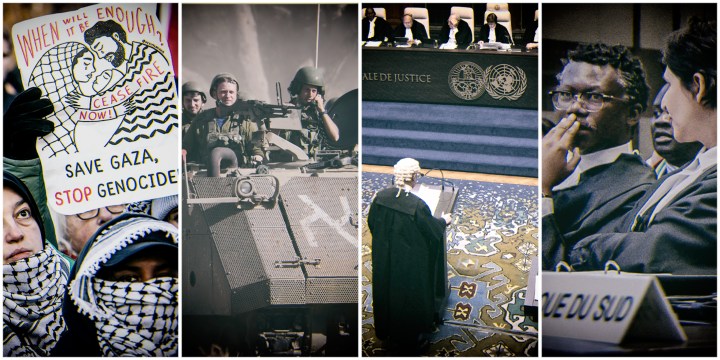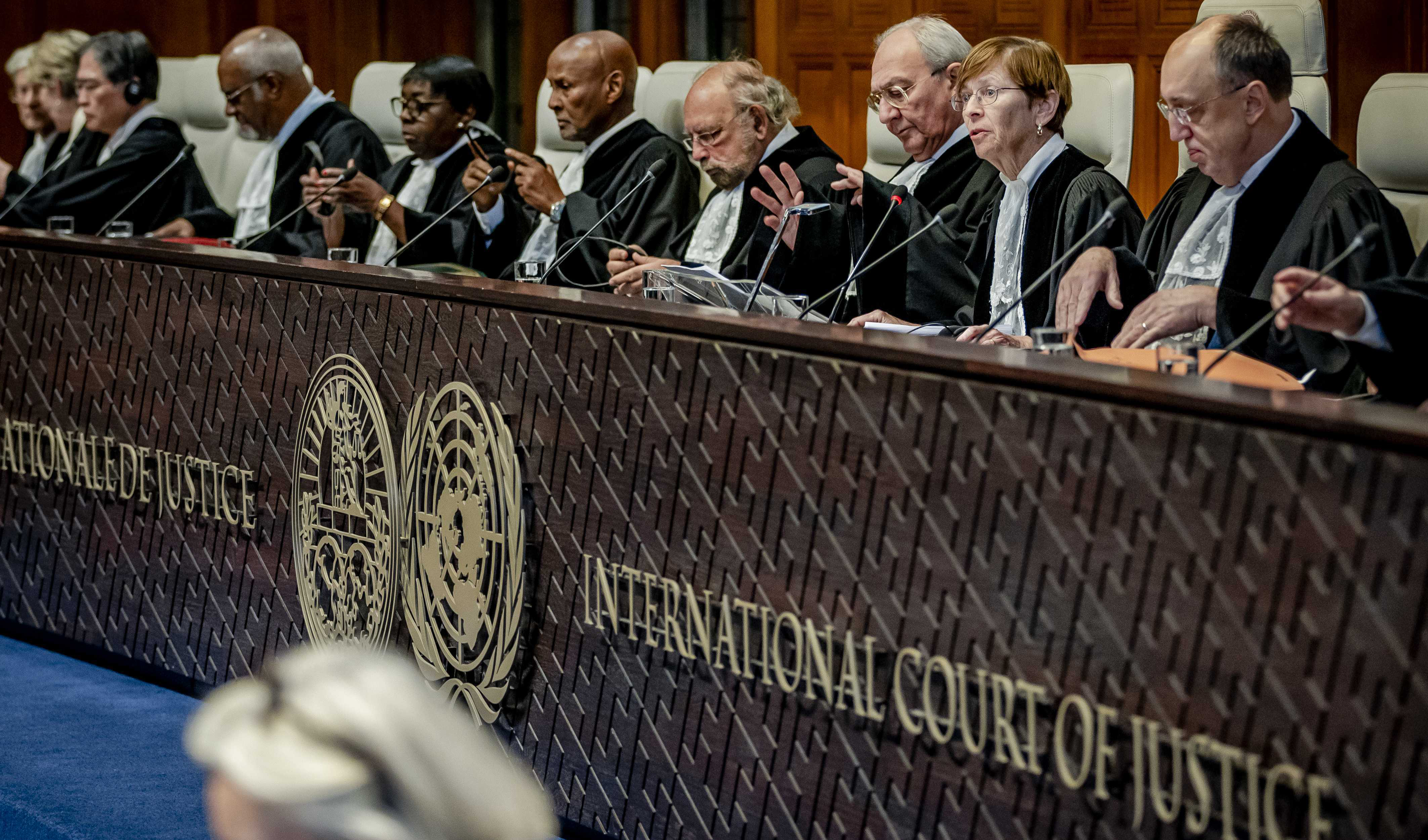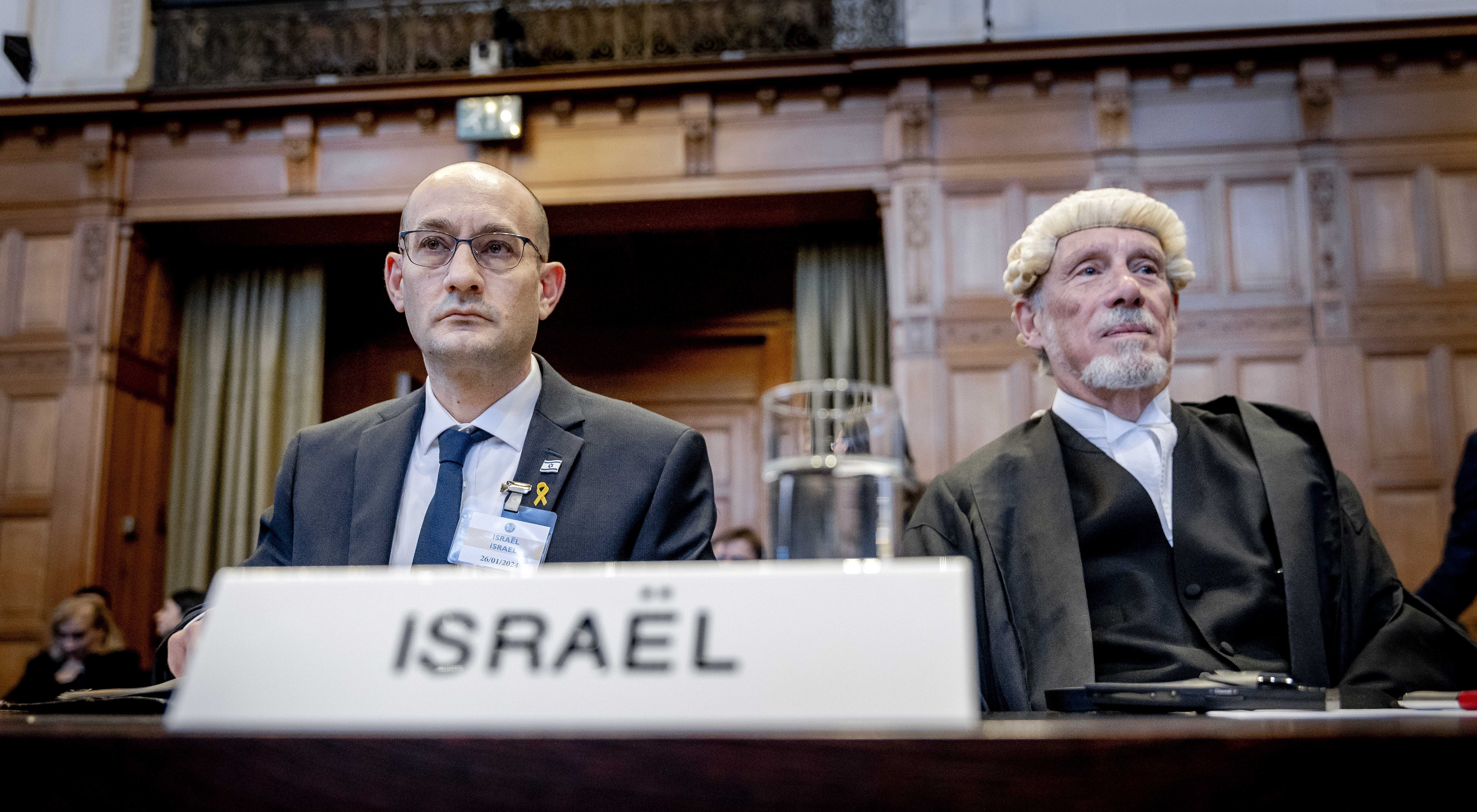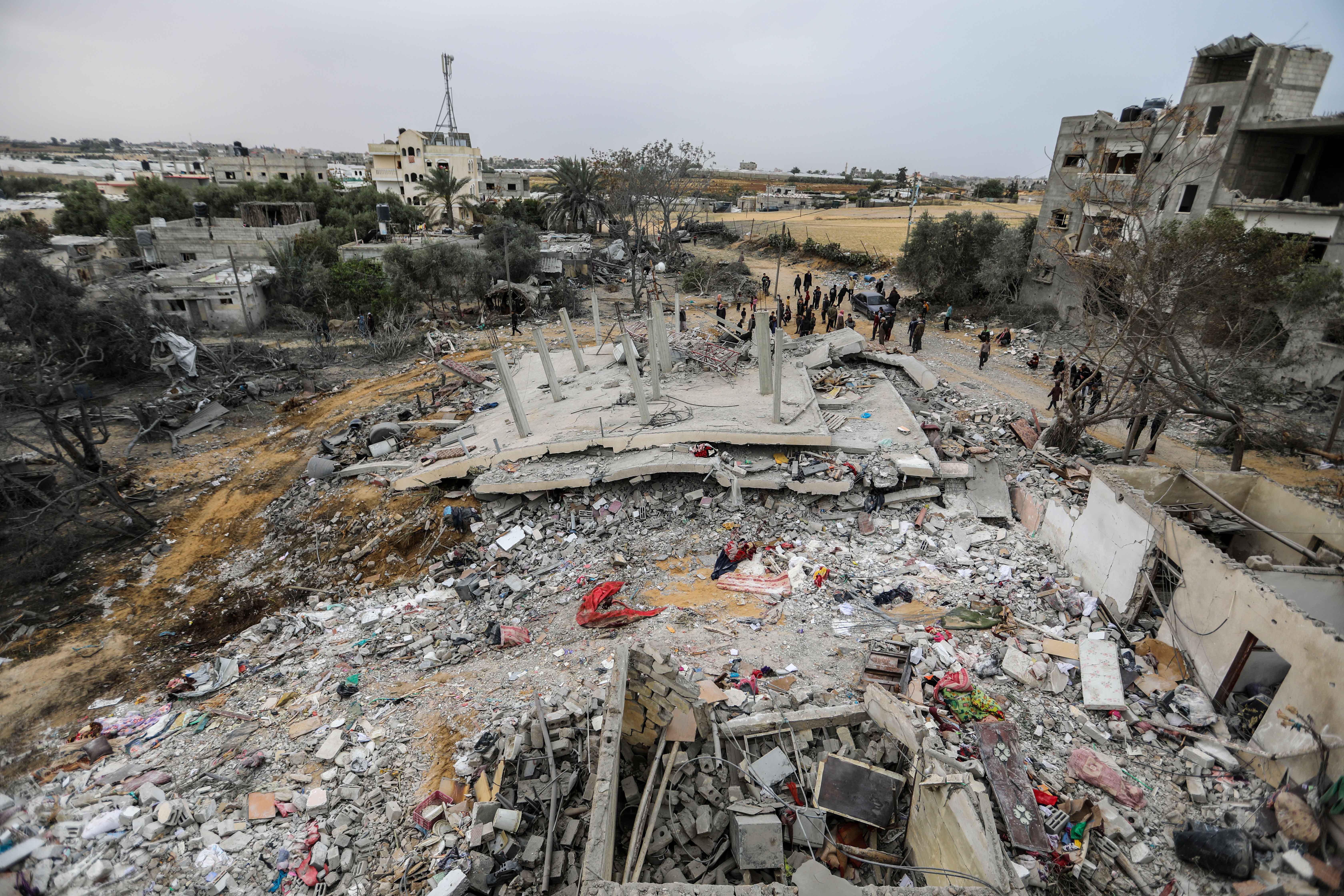MIDDLE EAST CONFLICT OP-ED
What will urgently bring Israel back within international norms of legality? Part 3

It may be unprecedented that a state by its actions declares itself outside the realm of international law, ignoring binding decisions of the International Court of Justice. Part 3 in a series.
Read Part 1 here and Part 2 here.
Some of the states engaged with the Palestinian question have joined South Africa at the International Court of Justice (ICJ) (like Brazil) or brought their own litigation against Israel (Nicaragua) or related litigation against Germany (Namibia, concerning Germany’s genocide against the Nama and Herero in 1908/9) and on Israeli genocide in the ICJ and in other fora.
In the US, a group of lawyers and legal organisations litigated against President Joe Biden for complicity in Israeli genocide. Despite failing for jurisdictional reasons that are not complete, the federal judge was sympathetic to the claim of the plaintiffs.
There is a case that few people may have picked up in South Africa, a Sharia-type intervention with some 48 lawyers claiming compensation for the damage that Israel has done and trying to quantify what it would require in compensation to put Gaza back into the state it was before the Israeli attacks.
Read more in Daly Maverick: Middle East crisis news hub
The South African case in the ICJ, for which a judgment was delivered on 26 January 2024, was a landmark decision in itself, even though the wording was in some respects couched in a general way. The court did not use the word “ceasefire”, but the judgment called for almost every element of a ceasefire to be implemented by Israel.
[In parenthesis, it should be noted that in this whole period, the International Criminal Court, which has previously been accused of bias against the South and against black people, has dithered and appears to have done little about the charges that have been reported in regard to Israeli genocide, compared with the speed it evinced in relation to charging Russian president Vladimir Putin over the war against Ukraine.]
South Africa’s case before the ICJ
In the first case whose findings were announced on 26 January 2024, the court made a provisional judgment which is binding, which didn’t immediately find Israeli acts to be genocide, but “plausible” as acts of genocide because a finding has to be decided by a full court case and not a provisional hearing. The case proper may take a few years.
But in this January case, they more or less identified all the features of genocide found in the Genocide Convention of 1948. The court made findings that amounted to demanding of Israel that it desist from a range of actions that comprise genocide or enable genocide to occur, including humanitarian and legal provisions, like allowing health and other aid provisions to reach the intended Gaza recipients that have been blocked by Israel to this day.
It’s important to understand that when one is talking about international law, the courts and also organisations like the United Nations have to manage a consensus between states, and in the case of courts, manage a consensus between its judicial officers in order to achieve a majority or unanimous judgment. That is why some words may be used or there may even be an intentional vagueness needed to secure the overall goals of the decision.
Interpretation and balance of forces/consensus
In any case, whatever the wording of a judgment, whatever the wording of a resolution of the UN General Assembly or Security Council, it still needs to be interpreted — and interpretation in international politics is not simply a question of learned minds applying themselves to a question. What meaning is given, and consequent action or inaction, is affected by the balance of forces between states.
What we have been witnessing in the months since the 26 January ICJ judgment is a change in the balance of forces in the world. This is a complex process that is by no means complete and will take time to consolidate or fail to cohere.
The change is manifested in the sense that the allies of the United States are wavering or withdrawing or making their own decisions in regard to some issues like the defunding of the UNRWA (United Nations Relief and Works Agency, the main organisation ensuring delivery of humanitarian aid) on the basis of allegations by Israel of involvement of some UNRWA staff in the 7 October attack, evidence that has not been produced. Some Western states have now resumed or continued funding UNRWA.
It may be in other questions, that they are trying to pressurise the United States to do or not do this or that, as seems possible from statements that do not indicate total agreement. And the same is happening for the United Kingdom.

Joan Donoghue (second right), President of the International Court of Justice and other judges at the International Court of Justice, prior to the hearing of the genocide case against Israel brought by South Africa, in The Hauge, The Netherlands, on 11 January, 2024. (Photo: EPA-EFE/Remko de Waal)
UN Security Council limited ceasefire call
Very significantly, the United Nation Security Council decision of 25 March was passed with no contrary votes, the US abstaining, and the United Kingdom voting with the majority. It called for a ceasefire during Ramadan, which was then almost over.
This level of agreement and the US withholding its veto power could not have been envisaged a month ago. Israel has been responsible in one sense for bringing about this uncontested resolution through the consequences of its genocidal actions in Gaza, the West Bank and East Jerusalem.
But what has been decisive is the mobilisation of people from all sections of society, in a range of states throughout the world, and this mass mobilisation and organisation does not appear to be dissipating. If anything, it seems to be increasing in intensity.
This is especially the case in the United States and United Kingdom, but we cannot know with certainty because we do not know from the media what is actually happening, and what is being suppressed, in a period when much pro-Palestinian activity is being penalised or not covered. Even stories from top Western media like The New York Times have been debunked, including by witnesses they relied on. (See further in a later part of this series).

Gilad Noam, Deputy Attorney-General for International Affairs, and lawyer Malcolm Shaw during a ruling by the International Court of Justice (ICJ) in The Hague, The Netherlands, on a request by South Africa for emergency measures for Gaza, 26 January 2024. (Photo: EPA-EFE / Remko de Waal)
Security Council decision interpretation controversy
Shortly after its abstention, the United States seemed to waver with some officials and its UN ambassador saying that the resolution was not binding. That is nonsense and it would be illegal not to abide by it. Under the UN Charter, all decisions of the Security Council are binding unless vetoed by one of the five states who have a veto power (Article 25, UN Charter).
None of those states used the veto. And only the United States abstained, and an abstention does not impair the legal quality of a decision. They backtracked on that statement.
But the abstention became academic in the light of the US supplying heavy weaponry shortly afterwards — on 30 March, the US undermined the resolution and later findings of the ICJ by providing a massive shipment of arms to Israel (see here and here).
It is shocking to see that even after decisions of the Security Council and the ICJ, Israel continued to pound Gaza, Yemen and other states with bombs and other weaponry killing children and several other innocent individuals.

People inspect damage and recover items from their homes following Israeli air strikes on 29 March, 2024 in Rafah, Gaza. (Photo: Ahmad Hasaballah/Getty Images)
ICJ third round
South Africa has returned twice to the ICJ seeking modification of the earlier findings in the light of worsening conditions — caused by denial of access to humanitarian aid and a range of genocidal actions of Israel. The court will only alter its original provisional order if conditions have changed.
In the first such case, seeking modification after the original order, the court refused to alter its order finding that the remedies suggested in the earlier order would suffice to meet the changed situation, despite it being perilous. That was not untrue if Israel were to have acted in good faith to carry out the first order — but it was carrying out a war of extermination, destroying all people and institutions without pause.
South Africa returned to the ICJ, and a judgment was delivered on 28 March, the second case brought by South Africa after the 26 January decision, to enforce obligations on Israel. In a remarkable decision, the court directed Israel to take a number of actions to ensure the well-being of the civilian population of Gaza and to ensure that humanitarian aid is delivered to the people of Gaza and to cease aggressive actions against them.
Israel has defied this. It may be unprecedented that a state by its actions declares itself outside the realm of international law, ignoring binding decisions of the ICJ.
Not every finding of the ICJ is binding, as with advisory opinions. But certain cases are binding decisions. In such a case, where a state defies such decisions, it is defining itself as being outside the realms of legality in the international world.
In such a situation, sanctions ought to be imposed and if the United States were to veto such sanctions, it would also put itself in a similar situation to Israel in relation to a binding decision of the ICJ, a decision that is binding on every state including the US, a decision whose implementation is a duty of every state in the world or every state member at the very least, so that it will be hard for the US to simply veto it.
The next part of this series will grapple further with the question “what is to be done?” at a time when there is a grave threat to the international order and building an alliance of the Global South remains embryonic. DM
This article first appeared on Creamer Media’s polity.org.za





On top of everything we have seen so far we now have the deaths of 7 international aid workers in a convoy of 3 vehicles returning from providing a cooked meal to starving Gazan civilians. Three separate missiles fired from fighter planes with deadly accuracy at three vehicles travelling hundreds of meters apart at least one of which was clearly marked as an aid vehicle. “Such accidents occur in wartime” was Netanyahu’s comment whilst smiling for the cameras.
This was no accident Mr Netanyahu.
Raymond Suttner states that ‘it may be unprecedented that a state by its actions declares itself outside the realm of international law, ignoring binding decisions of the ICJ.’
With respect, it is hardly unprecedented
The ICJ ruled against the Russian invasion of Ukraine in March 2022 calling for the immediate suspension of its military aggression and over two years later Russia continues to ignore that binding ruling
“The court did not use the word “ceasefire”, but the judgment called for almost every element of a ceasefire to be implemented by Israel.”
No. The court did not order a ceasefire which it would have done had that been the decision of the court. You’re putting words in the court’s mouth in order to support your narrative.
The court could not order a cease fire, it only has jurisdiction over nations, neither Hamas or Palestine is recognised as a nation by the court. It could not issue a cease fire order to only one party in the conflict and not the other as this would not be practical or enforceable.
It sure sounds like Raymond Suttner has an axe to grind, “Israel continued to pound Gaza, Yemen and other states with bombs”.
Yemen? Is Israel really continously pounding Yemen now too? Am I in an alternative reality?
And all very nice to provide an additional interpretation of the ICJ ruling for those of us who can’t think, but it sure sounds like he’s putting words into the justice’s mouths and taking away words too (like the call to release hostages).
I appreciate the DM coverage for covering both ends of opinions, but this sort of opinion piece doesn’t need to be 3 parts without fact checking either.
Yes, indeed! Suttner, like most of the so-called progressive left, are skilled wordsmiths, which ability unfortunately doesn’t necessarily include truthfulness, fairness, or a smidgen of balance.
War is ugly – regardless of the parties involved. Combatants are killed and maimed; civilians, likewise, are killed and maimed, but also suffer the consequences (displacement and hunger) of conflict.
Israel is currently fighting for its survival as a Jewish state, as it has been doing since 1948 – time and time again!
I wish I could be convinced that the unremitting drumbeat of hatred populating just about every domestic and international news medium since October 8, 2023, is unrelated to the fact that Israel is a Jewish state.
Mr Suttner and his ilk might do well to take a little time out of their busy lives to write as passionately about the millions of displaced, the hundreds of thousands of slaughtered, the starvation and deprivation of non-combatants, in, say, Sudan, the DRC, Ethiopia, Yemen, Ukraine – to name but a few ongoing conflicts. But they shan’t, for Hamas is the flavour of the year, and Israel the villain of the year.
Is the “hatred” against Israel as a Jewish state or is the focus on a state for which there is reasonable evidence that it is committing genocide? Israel simultaneously plays the victim even as it goes on the rampage. Even as it occupies, dispossesses, kills and humiliates another people. Since 1948. All this with impunity which is a privilege not granted to other states.
Every time someone writes someone has to raise other issues and tell them to write about that instead. It’s a ridiculous and obvious distraction. If someone writes about potholes should we enjoin them to write about some other more pressing matter? No. Deal with the issue at hand. In this case there is reasonable evidence Israel is committing genocide and it seems the veil is being lifted on the international order showing both its weaknesses and the hypocrisy of the west.
The most militarised population, armed to the teeth, and supported by the UK, France, Germany, and BFFs the United States is fighting for its survival? That’s certainly a claim I’ve heard before. More plausible though is that this is genocidal revenge combined with creating a deterrence (who would want to tangle with a maniac state after all).
It is the most tragic of ironies that the very people that experienced the crime of crimes has become so demented that they think the only way to be safe is to commit genocide.
“Israel is currently fighting for its survival as a Jewish state, as it has been doing since 1948 – time and time again!”
Why?
Was the area that has steadily grown into Israel since 1948 empty of humans when it became part of Israel? Do you know why the media always uses the term “occupied” for a large part of it?
As a South African, we all know how it turns out when we just kick out, kill, and oppress those who were there when we came along. And please, don’t bring ancient writing or religion into it. It isn’t helping either side look credible.
“I wish I could be convinced that the unremitting drumbeat of hatred populating just about every domestic and international news medium since October 8, 2023, is unrelated to the fact that Israel is a Jewish state.”
Are you convinced that the hatred for how the Taliban treats Afghans is unrelated to the fact that Afghanistan is an Islamic state?
Does criticising the decisions and policies of that country’s leaders automatically make a person Islamophobic? No.
Any and every government can, and must be held to account for the decisions it makes. Indirectly accusing those who do as racists by connecting that country’s religion to the acts of it’s leaders is a low blow, irrelevant, and frankly quite insulting.
You are just trotting out the standard Zionist responses used since 1948. The victim card, the “it must be because we are Jewish” angle, maybe the “we are the totally innocent only democratic state” nonsense.
Then if all else fails deflection and whataboutism are always a safe bet.
A more pertinent question is what is Hamas, Hezbola and the Houthies doing to cease their blatant flouting of international law. Oh, I forgot that these terrorists have a “legitimate” reason for their actions……the existence of Israel.
At best this is an alternative question, it is certainly not “more pertinent”
You are deliberately miss the point, there is a reason why people hate the existence of Israel as a state and have no problem with the existence of Jews.
Do your research.
Palestine has been under military occupation since 1967. Fifty Seven Years! The longest military occupation in modern times. This can’t be justified.
Israel has just annexed 800 hectares of Palestinian land for settlements. This is against international law.
Were the October attacks atrocities? Yes, undeniably so, I can never get with the killing of unarmed civilians.
Don’t get me started on the killing of children.
How do we view fifty seven years of illegal military occupation. How can we defend Israel’s right to exist while we ignore that it’s Israel who are denying Palestinians the right to sovereignty?